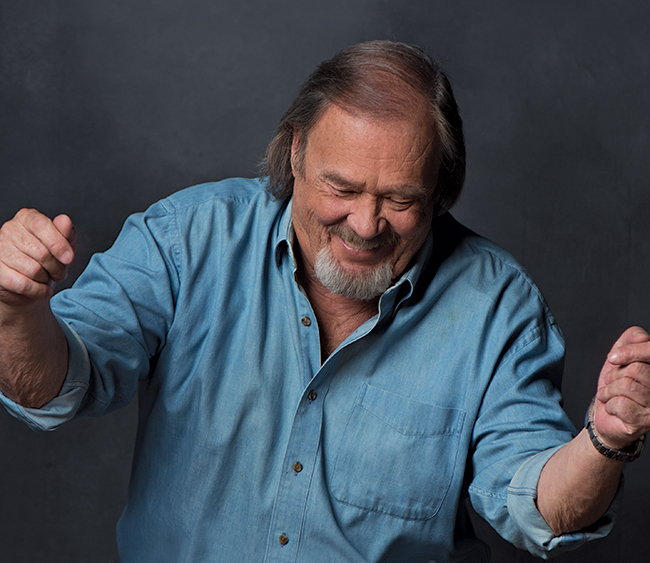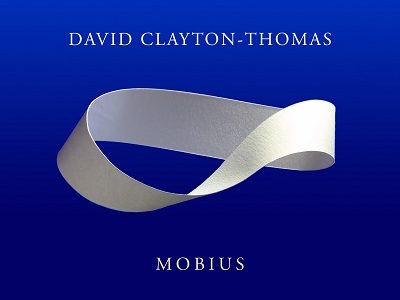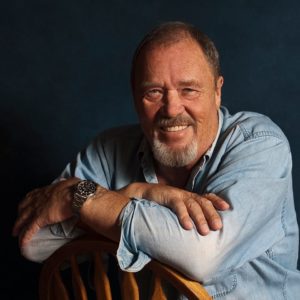
David Clayton-Thomas has one of those voices that is unmistakable, inimitable, and instantly takes you back to a certain place and time. For many music lovers, he is best known for his decades-long membership in the ground-breaking jazz-infused rock band Blood Sweat & Tears.
With iconic songs such as Spinning Wheel, And When I Die, You Made Me So Very Happy, God Bless This Child, Go Down Gamblin’ and Lucretia McEvil, the band dominated the charts, garnering accolades, including Grammy Awards, along the way.
Clayton-Thomas was born in the United Kingdom to a Canadian soldier who met his British bride while serving in England during the Second World War. The family moved back to Toronto, where a young Clayton-Thomas struggled under his father’s authoritarian rule and soon became a street tough as a teenager and found himself in and out of jails and youth reformatories until, by the early 1960s, he was able to parlay the love for music infused in him by his mother, as well as a natural charisma and booming, powerful, bluesy voice, to begin his career as a vocalist and songwriter.
He joined Blood Sweat & Tears, an American band, in 1966, and the rest is music history. He spent most of the next 40 years touring the world with the band, although they did not record much new music after their heyday. Clayton-Thomas issued solo albums in 1972, 1973, 1977 and again 1998. Upon leaving Blood Sweat & Tears for good in 2005, he has been on a creative tear, releasing nine solo albums since then. Mobius, he most recent, came out a few weeks ago and sees the now 76-year-old singer/songwriter at the peak of his creative powers, more than five decades into his remarkable career.
“I think one of the reasons I have been so busy is because the last 30 years of Blood Sweat & Tears one of my biggest frustrations was that although we toured constantly, we never recorded. There was no incentive to record because the money was being made in playing the oldies on the road. And by the time I packed it up in 2005, I had dozens of songs written that I had been working on over the years but had no opportunity to record. So, the first thing I did when I returned to Canada of course was to start recording. And I have managed to put out an average of an album a year over the last 10 years or so,” said Clayton-Thomas from his home in Toronto.
While Mobius is a solo record, Clayton-Thomas chose to be quite collaborative on the project, utilizing the exceptional compositional talents of the four musicians who played on the record: George Koller, Eric St-Laurent, Larnell Lewis and Lou Pomanti.
“George Koller is one of the most extraordinary bass players in the country. He is a multiple national jazz award winner and a very highly esteemed musician. We have co-produced three albums together now, so he has become very much part of my team and he is also my band leader when I do concerts. He is a great collaborator. Lou Pomanti toured with Blood Sweat & Tears in the 1980s, and I remember the incredible story of how it first happened. We lost our piano player and we were in the midst of a world tour. I knew of Lou and knew of his playing, so we called him up, and he was playing a little piano bar in Halifax at the time. And we said, ‘hey do you want to join Blood Sweat & Tears?’ And he said sure. I said, ‘can you be in Buenos Aires tomorrow?’ So, we sent him an airline ticket and he ended up touring the world with me for about five or six years. He is a tremendous musician,” said Clayton-Thomas.
 “Another person I really wanted to work with, and we actually arranged the sessions to make sure we could get him, was Larnell Lewis. He is an extraordinary drummer and of course he got a Grammy Award last year [his third!!] for his jazz band Snarky Puppy. He is such an explosive player; really original and different. Eric St-Laurent has been on my last couple of albums. He is a killer guitarist from Montreal and is one of those guys who has all the education, technique and dexterity of a jazz player, but he can rock. So those were the four guys who I made the album with.
“Another person I really wanted to work with, and we actually arranged the sessions to make sure we could get him, was Larnell Lewis. He is an extraordinary drummer and of course he got a Grammy Award last year [his third!!] for his jazz band Snarky Puppy. He is such an explosive player; really original and different. Eric St-Laurent has been on my last couple of albums. He is a killer guitarist from Montreal and is one of those guys who has all the education, technique and dexterity of a jazz player, but he can rock. So those were the four guys who I made the album with.
“And one of the things we did on this album, by co-writing it with the other four musicians, is that each one of them brought their own musical influences to the song. It goes from a Samba song [Carnivale] that I wrote with Eric to a real funk/R&B tune that I wrote with Larnell, so there really is an amazing range of styles. And like most musicians, I hate the term ‘genre’. There is good music and bad music. It is the intent of the player and the heart and soul that they put into it and of course the skills of the musicians. And that defies genres. Now its just my opinion, but I think that really great art defines categories. It is its own category.”
Speaking of Carnivale, it is one of Clayton-Thomas’ favourite songs on Mobius, and with good cause, as it is a lush, laconic, sultry samba tune that incorporates Brazil’s national music in a way that is almost like a musical travelogue, intertwined with Clayton-Thomas’ unmistakable vocals.
“It was the first one the label made a video for because they just thought it was such an outstanding track, and it was a track where everything just fell together perfectly. And I go back many years with Rio. I have played there several times and I just love the city. There are very few places like it, I will mention Cuba for one and the east coast of Canada where music is not just a business, its part of the culture, it’s part of everyday life. It permeates everything, from the moment you get off the airplane and it pulses, and you get up in the morning an it’s still going. It seems like the pulse of Samba drives the city of Rio,” he explained.
The second single of the album, one that is generating a great deal of interest, airplay and streaming, is Back to the 60s, which is more than just an ode to the nostalgia of a bygone time, but a longing for the better sentiments and progressive ideas that came from that period in modern history and culture.
“I write all the lyrics and they tend to be personal statements of mine. Back to the 60s was basically inspired by the Parkland kids after that horrible school shooting, and the way those kids went out into the streets and marched against those sorts of shootings. I hadn’t seen that since the 1960s when 600,000 people came to Woodstock. And I was wondering where did that go, where did that hope and that philosophy and that dream of peace – where did that go. Is it gone, is it lost?” Clayton-Thomas asked.
 “And what I saw from those kids inspired me to write that song. There is a line in the song that says, ‘sex and drugs and rock and roll is all that remains, and the dream of peace forever has long since been forgotten, oh what a shame.’ I think that sums up the whole song right there. When you talk about world peace now it sounds naïve, but it was the music that brought everybody to Woodstock. It was a movement.”
“And what I saw from those kids inspired me to write that song. There is a line in the song that says, ‘sex and drugs and rock and roll is all that remains, and the dream of peace forever has long since been forgotten, oh what a shame.’ I think that sums up the whole song right there. When you talk about world peace now it sounds naïve, but it was the music that brought everybody to Woodstock. It was a movement.”
Another song that has a definite topicality to it is the poignant and powerful Where Did They Go, which talks about how people living in disaster torn parts of the world are often abandoned to fend for themselves, especially once the news cameras have moved on to other stories.
“The song was actually written about 10 years earlier. George Koller was putting out an album called Jazz for Haiti, after the horrible earthquake in Haiti and he started a foundation to raise money for the people down there. George asked me if I would co-write a song with him for this album and I did. And then 10 or 12 years later comes the hurricane in Puerto Rico and the absolutely dismal response from the government. Those people were just left on their own; they were abandoned. When that came along I said to George that I could remake the lyrics of that song to make it encompass all disasters, not just specifically the Haitian earthquake. So, I rewrote the lyrics for this album and we re-recorded the song,” he said, adding that, like the artists of the 1960s, when artists of any media see injustice, inequality and inhumanity, they have an opportunity to step up and reflect their views through their art.
“We’re definitely influenced by things like that, and we are definitely influenced by what we see on TV or read online every day. We are bombarded with information and this Trump administration has been a great boon for artists, comedians, filmmakers and songwriters. It’s a never-ending source of material. And there is so much stuff that it allows everybody to stake out their own position and that’s the reason for the polarity we find in society today. You can find a media outlet somewhere that agrees with the most outrageous beliefs, so they stake out that position and everything else becomes ‘fake news.’
“Just before you called I was watching CNN and they were on about this constant barrage of misinformation that is coming from the Trump administration and anybody who disagrees with them is categorized as fake news, and really the fake news is coming from Trump himself – he has flipped it on his head. And this is basic Orwell; this is what George Orwell said was going to happen all those years ago. He was bang on in so many ways.”
After an album that contains songs that challenges your thoughts and tug at your heart, as well as lovely melodic songs which are perfect for a romantic evening, Mobius ends on what only be described as a bluesy, badass note with the song Passin’ Through.
“That comes from more than 40 years on the road. That song was actually an afterthought. It was literally written in the studio, with me scribbling lyrics on a pad while the guys were working on the groove. And you don’t write a song like that unless you’ve been there and done it,” Clayton-Thomas said with an emphatic chuckle.
 “And when we got to the end, the guys wanted to know how I wanted it to end and I said, ‘just let it fall apart, like we’re all saying, enough of this shit, let’s get in the car and move. So, at a certain point we just looked at each other and just let it fall apart. We left it like that and put it on the record because that in itself is a statement.”
“And when we got to the end, the guys wanted to know how I wanted it to end and I said, ‘just let it fall apart, like we’re all saying, enough of this shit, let’s get in the car and move. So, at a certain point we just looked at each other and just let it fall apart. We left it like that and put it on the record because that in itself is a statement.”
While Clayton-Thomas said he still loves to perform both the old repertoire and his newer material, the rigours of travelling and extensive touring no longer appeal to him. So, he limits his appearance to special shows and festivals, although he did say he expects with the positive response to Mobius, that his touring schedule will be a little busier in 2019.
“I am just doing a few local shows this year and that’s all, ones that are an easy drive and not too far from home. My taste for going on the road is over. First of all, I will be 77 in September, and going on the road is a contact sport. You’ve got to be in really good shape to do it. And although I am in reasonably good shape, I don’t think I am up to it,” he said.
“I did it for 50 years and for many of those years with Blood Sweat & Tears we did in excess of 250 concerts a year all over the world, which doesn’t leave many days for a personal life. So, one of the reasons I left Blood Sweat & Tears was to get away from that, the constant touring. It’s not the gigs, the gigs are the reward at the end of the day, it’s the travel that wears you down.
“I enjoy my home. I enjoy where I live. I enjoy being able to plan and work on an album for a year in my little home digital studio, and in the winter time go into the studio and record it. That’s very, very rewarding for me. And touring isn’t so much any more. Now my agent knows if something really nice comes along, a nice performing arts centre, a nice festival, I will do it. I think doing only a small number of shows makes it special for the audience too. For the last few years I have done two nights at Massey Hall with the Toronto Symphony Orchestra. That was a dream of mine to do something like that forever. And to headline the Toronto Jazz Festival a couple of years ago at Nathan Phillips Square was a wonderful event. I am interested in doing concerts that are events now, not just going out on the road for weeks or months on end.”
At present, there is just one show this summer, on July 28 at the Midland Cultural Centre in Midland Ontario. For tickets or information, visit http://midlandculturalcentre.ticketfly.com/event/1706722-david-clayton-thomas-midland.
For more information on David Clayton-Thomas, his solo catalogue and upcoming shows and new releases, visit http://www.davidclaytonthomas.com.
- Jim Barber is a veteran award-winning journalist and author based in Napanee, ON, who has been writing about music and musicians for a quarter of a century. Besides his journalistic endeavours, he now works as a communications and marketing specialist. Contact him at jimbarberwritingservices@gmail.com.
SHARE THIS POST:
